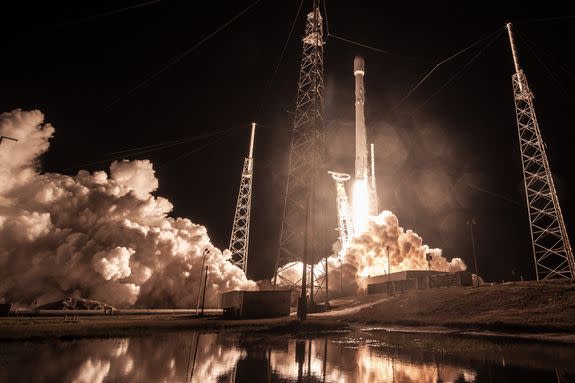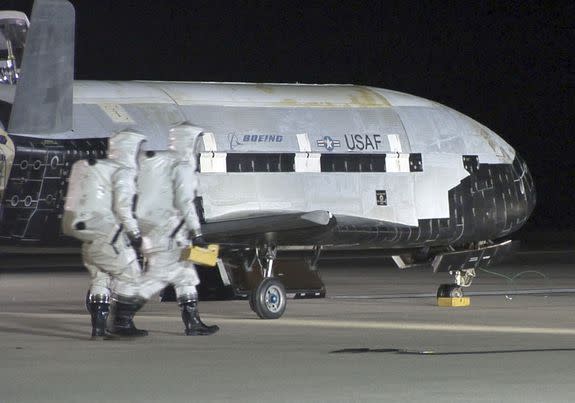Trump's 'Space Force' is nothing new: Here's what the military is already up to in orbit

Without warning, President Donald Trump announced on Monday that he's directing the Pentagon to form a new arm of the military called the "Space Force."
Sounds pretty cool right? Well, as cool as it may sound, even if it is eventually created, the Space Force may not change very much for U.S. military operations in space.
The U.S. military already has a huge presence in orbit, armed with a fleet of both known and classified satellites that spy down on potential threats to the nation day and night.
SEE ALSO: A woman sued NASA to keep a vial of moon dust. But is it really from the moon?
"The U.S. military has been very active in space for 60 years," John Logsdon, the former director of the Space Policy Institute at George Washington University, said in an interview.
"This is not some breaking point of militarizing space," said Logsdon.
This is a dumb idea. The Air Force does this already. That is their job. What’s next, we move submarines to the 7th branch and call it the “under-the-sea force?” https://t.co/S1urOuJBe6
— Mark Kelly (@ShuttleCDRKelly) June 19, 2018
Trump announced the Space Force prior to the third meeting of the National Space Council, a well-publicized ongoing meeting that mostly boasts visionary ideas about America's future in space, but doesn't have any law-making power.
"By saying what he said, where he said it, with the media paying attention, it caught the world's attention for something that’s been going on a long time," said Logsdon.
"But this isn’t some fundamental shift," he added.
In fact, the U.S. already spends more on military operations in space than it spends on NASA's entire $19 billion annual budget, said Logsdon.
The unclassified Air Force budget for things like military communications satellites is around $15 billion per year. The classified National Reconnaissance Office space budget, however, adds an estimated $10 billion to U.S. space operations, said Logsdon, putting the total number at $25 billion.
"We have billions in national security assets up there right now," said Logsdon.
Isn't space supposed to be peaceful?
The Outer Space Treaty, recognized by over 100 nations including the U.S., limits some military activity in space, "but not very much," said Logsdon.
The treaty outlaws nuclear weapons and weapons of mass destruction, but does not prohibit nations from acting defensively.
And as more nations enter space and develop advanced military technologies, space defenses have become necessary — if not critical.

Image: spacex
The Chinese, for example, launched a missile in 2007 to illustrate that it could blow up satellites in space.
"Several recent actions, such as the China maneuver where they targeted their own satellite to attack and created thousands of pieces of space debris in a demonstration of their ability to target a space object, as well as other overtures by other nations, make it essential that we have defensive capability," Vickie Sutton, a space law expert and former assistant director in the White House Science Office under George W. Bush, said over email.
For the last decade, said Sutton, a branch of the Air Force called the Air Force Space Command has overseen America's military space operations, "and the mission is defensive," she said.
"It’s been the policy of the U.S. since Kennedy [in the 1960s] that military activities of a defensive character are peaceful," said Logsdon.
Will a 'Space Force' change anything?
Trump cannot create a new, sixth arm of the military on his own.
"To have a fully-fledged force with a new 4-star general position, new uniform, and budget would require congressional action," said Logsdon.
But even if this were accomplished, it's not likely a whole lot will change.
"The simplest version is taking the existing [Air Force] Space Command and giving it a new label," said Logsdon.
The Space Command does quite a bit already.
The agency has dominion over all Department of Defense satellites (classified and unclassified), watches the entire globe to monitor missile launches, and surveys the location (and other information) of every satellite other nations launch into space.

Image: DoD/Corbis via Getty Images
A Space Force would almost certainly remain defensive.
"Nobody is talking about orbiting nuclear weapons or putting military bases on the moon," said Logsdon.
However, it seems no one — even members of Congress — have any ideas about how Trump's Space Force might work.
"We still don't know what a Space Force would do, who is going to be in it, or how much is it going to cost," U.S. Representative Mike Turner, who serves as the Chairman of the House Armed Services Tactical Air and Land Forces Subcommittee, said in a statement.
There are, though, arguments for a defensive Space Force, even if it's largely just a change in name.
"The argument for a separate space organization is by being in the Air Force it takes second priority to airplanes," said Logsdon.
"Our economy — basically our way life — depends on the use of space assets overall," he said, citing communications, GPS navigation, T.V., and all sort of transmitted information.
"Unlike land, sea, and air, we don’t have an organized military function that is uniquely dedicated to protecting our assets in space."
And at the very least, a Space Force would be that.
WATCH: NASA is attempting to fly a helicopter on Mars for the first time


